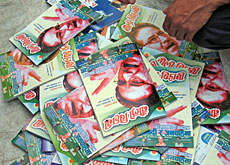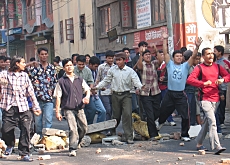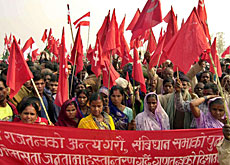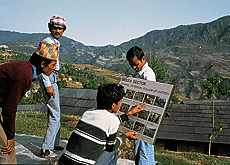Switzerland optimistic about peace in Nepal

Switzerland has announced its intention to provide technical and financial support to the peace process in Nepal.
The Special Adviser for Peace Building in Nepal, Guenther Baechler, said Switzerland’s support was conditional on the Nepalese government and Maoist rebels following a clearly defined roadmap to peace.
“The peace process has to be successful and sustainable, so both sides have to credibly prove that they are willing to go down the same avenue for peace-building,” Baechler told swissinfo.
He said technical support could take the form of help with disarmament, political advice and election monitoring. No figure has yet been put on the amount of financial aid Switzerland would be prepared to offer.
“We are currently spending SFr19 million ($15 million) on our development aid [per year], and this money does not cover any additional help, such as demobilization and election monitoring,” said Jörg Frieden, the Swiss Agency for Development and Cooperation (SDC) country director in Nepal.
Baechler’s comments came one week after the rebel leader, Prachanda, and Nepal’s prime minister, Girija Prasad Koirala, met for the first time since the insurgency started more than ten years ago.
At the meeting in the Nepalese capital Kathmandu, the two leaders agreed on an eight-point peace plan, which is seen as the first breakthrough since King Gyanendra gave up his absolute rule at the end of April this year.
Hope
“There is definitely hope. Individual leaders of both sides have shown a remarkable political will to settle the conflict peacefully,” Baechler said.
As part of the agreement, the government said it would dissolve parliament and set up an interim administration that would include the Maoists.
An interim government including the Maoists could facilitate the work of the SDC, which has been active in Nepal for more than 40 years.
“The Maoists want to improve the lives of poor people, farmers and villagers living in remote areas. If there are political forces to defend the social agenda in this country it would be an advantage for our development cooperation,” Baechler added.
The Maoists’ main demands are the establishment of a constituent assembly and the dissolution of parliament, which was created on April 24 after King Gyanendra bent to popular pressure following two weeks of mass protests that crippled the country.
The future of the king, however, is still a bone of contention between the Maoists and the political parties. The rebels hope elections will clear the way for abolishing the monarchy, but the prime minister has ruled that out.
Arms management
Earlier this week the Nepalese government announced that it was not willing to create an interim government unless the Maoists laid down their weapons. But the rebels said they would not do so until elections were held for a body that would draw up a new constitution.
Both sides have called on the United Nations to supervise the management of arms.
“The Maoists know very well that they have to lay down their arms and I think the government also knows that it has to restructure its own army.
“Of course they don’t have the consensus yet but I am confident that they will find a solution for arms management,” Baechler said.
swissinfo, Billi Bierling in Kathmandu
Nepal is one of the Swiss Agency for Development and Cooperation’s (SDC) priority countries. The SDC in Nepal works mainly in rural areas, which are at least partially controlled by the Maoist insurgency.
The agency is active in rural infrastructure development, building suspension bridges and roads.
It is also involved in activities linked to the conflict such as human rights initiatives, both nationally and at local level.
Population of Nepal: 26.3 million.
The Maoist rebels have been fighting to abolish the monarchy since 1996. The insurgency has left more than 13,000 people dead.
In April this year King Gyanendra reinstated parliament and gave up direct rule, following mass anti-monarchy protests.
On June 16 the Maoist leader, Prachanda, visited Kathmandu for the first time in 25 years to meet prime minister G.P. Koirala.
Prachanda’s talks in Kathmandu have resulted in both sides agreeing to dissolve parliament and to set up an interim government that will include the rebels.

In compliance with the JTI standards
More: SWI swissinfo.ch certified by the Journalism Trust Initiative



You can find an overview of ongoing debates with our journalists here. Please join us!
If you want to start a conversation about a topic raised in this article or want to report factual errors, email us at english@swissinfo.ch.